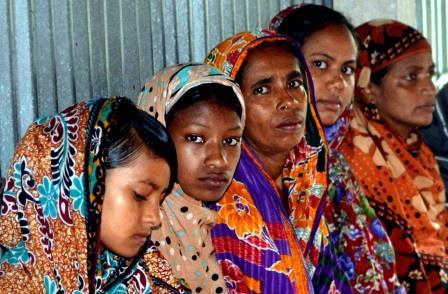Inspiring change for rural women in Bangladesh through the use of agricultural biodiversity

In Bangladesh, a woman's influence in society often seems to be restricted to the boundaries of her home. Yet a closer look reveals women as influential decision-makers when it comes to managing locally available agricultural biodiversity.
This year for International Women's Day, Bioversity has collected stories that inspire change. This story focuses on Bangladesh, where a woman's influence in society often seems to be restricted to the boundaries of her home. Yet a closer look reveals women as influential decision-makers when it comes to managing locally available agricultural biodiversity.
Bangladesh is one of the poorest and most densely populated countries in the world with an estimated average population density of around 964 inhabitants per square kilometre. Around 80% of the women in Bangladesh live in rural areas.
In a country like Bangladesh, women’s influence in society often seems to be restricted to the boundaries of her home but a closer look, especially within the rural communities, reveals they have multi-tier responsibilities within and beyond the confines of their house and home garden. They make decisions about which crops and varieties to grow, eat, and sell. These women farmers can be considered visionaries who play a significant role in managing agricultural biodiversity.
Bioversity International is leading efforts to conduct an agricultural biodiversity baseline assessment within these communities in the vulnerable and impoverished coastal systems of Southern Bangladesh as part of our contribution to the CGIAR Research Program on Aquatic Agricultural Systems.
An important part of these efforts has included listening to the women farmers to finding out more about how they contribute to the conservation and use of locally available agricultural biodiversity.
Focus group discussions carried out in seven communities, across the Southern Bangladesh Polder Zone, with both men and women, indicate that the women who participated possess an innate desire to improve themselves through better access to markets, quality planting materials, knowledge and training. They represent a growing number of women who are beginning to redefine the norms of their society.
For example, women from the village of Taraliin Satkhira expressed their interest in cultivating a diverse selection of vegetables at a large scale but could not proceed due to lack of cultivable land, money, technologies and knowledge. They are very much aware of the opportunities that can be gained through diverse vegetable cultivation which they consider to be a more practical income generation option given the limited resources within their reach such as land and finances.
In the village of Gangarampur, Khulna, the majority of women are Hindus and less restricted in their mobility. The focus groups revealed that these women continue to persevere in marketing the produce from their home gardens despite facing hurdles such as often having to walk several kilometers to the nearest market due to inaccessibility of roads, the unavailability of public transportation and the seasonal monsoon. This causes a delay in the product reaching the market, yet the women remain unfazed and continue to seek options to improve — for example, finding out more about the technology to help them improve broiler production.
In the highly saline village of Akra, Khulna, where the production of vegetables has been hard hit by salinity intrusion in farming systems, the women were noted to be open to cultivating a more diverse selection of crops and varieties which have more resilience to the growing environment and mitigates risk of an entire harvest being lost during a growing season including reintroducing neglected and underutilized locally available species.
Women are also instrumental in ensuring the dietary components that enter the household food basket. Much of what is grown on the home farm contributes to the household dietary intake which is complemented with purchases from the market which are usually bought by the men. These women are very eager to increase their knowledge on the nutritional content of different food items and are aware of the importance of having a balanced diet for their household. This is a challenge for poor households, especially with the seasonal deprivation of food during the pre-harvest of rice in many of these parts of Bangladesh.
What is clear from these early findings is that women are in fact playing an active role in the management of agricultural biodiversity which can contribute to the resilience of their farming systems, improve nutrition and increase incomes, and in turn, empower the women within the communities. Yet as the role that agricultural biodiversity can play in the home farm as a potential development tool is often overlooked by mainstream research agendas, so is the role of the women.
By highlighting the potential of agricultural biodiversity, Bioversity International is also highlighting the role of these women farmers.
Blog by Dorothy Chandrabalan, Programme Specialist, Bioversity International
This work contributes to the CGIAR Research Program on Aquatic Agricultural Systems.
Photo: Women take part in a community session in Khekuani, Barguna. Credit: Bioversity International/D.Chandrabalan.
